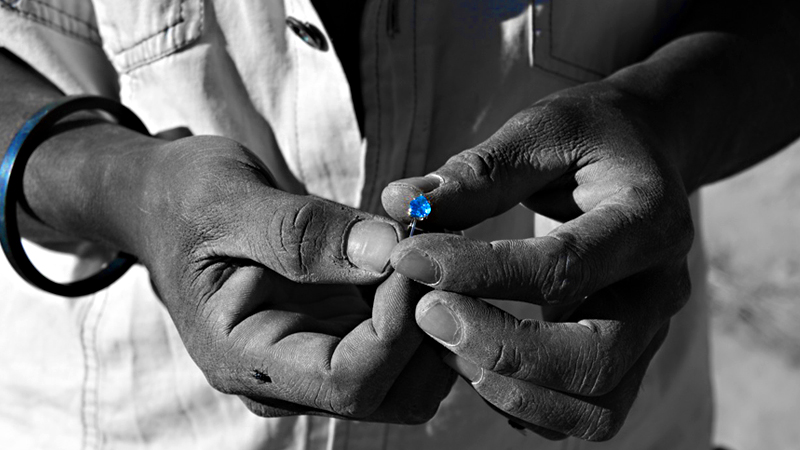
Graduate certificate prepares students for the sustainability and corporate social responsibility field
In response to the growing need for sustainable development training due to concerns about environmental and social issues in mineral supply chains and post-carbon transition of communities, the University of Delaware is launching a Minerals, Materials and Society (MMS) graduate certificate with classes starting in January 2020.
Under the leadership of Saleem H. Ali, Blue and Gold Distinguished Professor of Energy and the Environment at UD, the MMS program is among the first of its kind in the United States that takes an interdisciplinary approach to linking science and policy issues associated with mineral and material sourcing. The program builds on UD’s strengths in earth science as well as in material science, energy policy, fashion and apparel studies and a range of social science disciplines.
“Minerals are the primary resource for most products; infrastructure, appliances, cosmetics—you name it—and there is a minerals connection to the product,” said Ali. “Even food production requires minerals, such as phosphates, which are often mined. Thus our program has the potential to literally bring the field of sustainable supply chain management down to earth.”
The program will consider not only mined mineral resources but also synthetic materials that are increasingly being compared to mined minerals as substitutes due to environmental and social concerns. Recycling and remanufacturing options that embrace emerging paradigms, such as “a circular economy,” and are benchmarked with the United Nations Sustainable Development Goals are part of the curricular design.
The 15-credit program, which can be completed in 18-24 months, is designed to equip students with the skills necessary to obtain jobs in the growing field of sustainable supply chain management and environmental and social responsibility, and to become world leaders and game changers in this arena. While the majority of the classes are offered online, students will also participate in on-campus, one-to-two-week intensive classes during the summer and winter sessions. In addition, research partnerships and experiential learning opportunities with several international universities, including the University of Queensland’s Sustainable Materials Institute in Australia and the National University of Science and Technology in Russia, are offered. Formal memorandums of understanding between UD and these institutions have been developed, and field courses will be offered in both countries as part of the program.
“Only by understanding the issues around supply chains can we begin to make a positive impact on the world around us,” said Ali. “By partnering with the University of Queensland in Brisbane, Australia, we will offer online courses in responsible resource development that will allow our graduates to make powerful impacts on their companies and supply chains.” He added, “Moscow’s leading science university was chosen as a strategic partner location since Russia is among the world’s largest mineral producers and also in the spirit of science diplomacy, which should be an important goal of educational institutions in these troubled times in world affairs.”
Student exchange will also be conducted with the Chinese University of Geosciences in Wuhan, China, and research collaborations with numerous other global institutions are planned on an ad hoc project basis.
Candidates for the Minerals, Materials and Society program include, but are not limited to, mid-career energy and extractives industry and sustainability professionals, government officials and other civil servants, economists and scientists, graduating college students studying related disciplines, and nonprofit, museum and jewelry industry professionals. Current UD students are also welcome to take courses offered through the program.
“As CEO and president of the Jewelers Vigilance Committee, an organization whose mission is to educate and assist the U.S. jewelry industry with legal and regulatory compliance, we welcome the University of Delaware’s new Minerals, Materials and Society program,” said Tiffany Stevens. “This educational platform will bring much-needed interdisciplinary education to the jewelry sector and help companies and countries prepare for successful environmental and social audits and certifications.”
A senior fellow at both the Columbia University Center on Sustainable Investment and Georgetown University’s School of Foreign Service, the World Economic Forum recognized Ali’s leadership in forming collaborative programs between academia and industry with a Young Global Leader citation in 2011. He has also been honored as an Explorer by the National Geographic Society for his work on using the environment to help resolve conflicts. Ali is a member of the United Nations International Resources Panel and the Scientific and Technical Advisory Panel of the Global Environment Facility, the world’s largest multilateral trust fund for the environment, held in trusteeship by the World Bank. He holds a doctorate in environmental planning from MIT, a master’s in environmental studies from Yale University and a bachelor’s in chemistry from Tufts University.
The program will be governed at UD through a council of faculty from across campus who were part of the inception committee formed after the Unidel Foundation awarded the grant to develop it in 2018. Patricia Syvrud, immediate past executive director of the World Diamond Council, was recruited by UD to work with Ali to develop the program, which will also have an external leadership council comprising leaders from industry, civil society and government agencies.
Applications are being accepted on a rolling basis. For more information, contact Patricia Syvrud, program manager, at psyvrud@udel.edu or +1-760-525-9393 or visit www.sites.udel.edu/ceoe-mms/.

